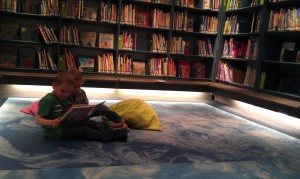Rhyme or Reason?
Tuesday’s symposium left me feeling a little unsettled.
How can a story not have a beginning, middle and end? Isn’t this the intrinsic pattern of everything?
Adrian made a helpful point in his blog post on Tuesday evening; if a book were not bound together with each page numbered, how would we make sense of it? How would we distinguish its beginning, middle and end?
This made me think of a children’s game that allows kids to create their own story. The best way to describe this game is to imagine a picture book with its binding and page numbers removed. Children are then free to arrange the story’s pages in whatever way they like. For example, what was once a middle might become a suspenseful end, or the beginning might start with the end, and so on.

If we forget about the conventions of a book we are free to create the meaning of our choice. The point I am trying to make here follows on from what Adrian said in Tuesday’s symposium; language can override reason (the reasonable conventions of a book i.e. beginning, middle and end) even though most of us think that reason comes first.
Laura Doguet’s post on this week’s symposium points to the internet as a contemporary communication platform that exists without traditional conventions, like a book without binding and page numbers. Does this mean the internet allows us to freely arrange (or rearrange) meaning in a similar way to the children’s game I mentioned earlier?
I will stop now before I completely confuse myself, but I think this is an interesting way to think about language and reason.